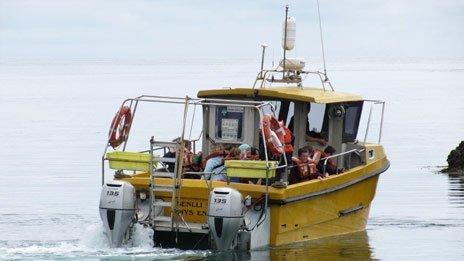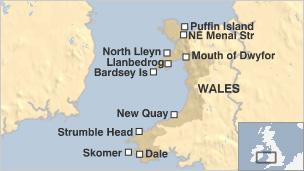Marine conservation zones: Fishermen bid for 'balance'
- Published

Fishermen in Wales say they have a proven record of working sustainably in the marine environment
While the Welsh government consults on setting up 10 highly protected marine conservation zones (HPMCZ) around Wales' coastline, one report by fishermen offers a different approach.
Creating the zones would mean a ban on fishing, dredging and anchoring in all or some of the areas.
This consultation by the Welsh government is the first of three and has already run into problems.
The arguments centre around the 10 zones under discussion in north and west Wales, which were formed on the advice of the Countryside Council of Wales (CCW), and fully supported by the Marine Conservation Society (MCS).

Map of the potential sites for conservation zones
On Wednesday, the Welsh Fishing Association (WFA) will hand Environment Minister John Griffiths a copy of a report called Striking the Balance, which outlines the key principles of the WFA's eco-system-based approach.
The report claims to offer "high levels of environmental protection" without impacting communities.
One of the zones is around Bardsey Island, off the Llyn Peninsula.
Boatman and lobster fisherman Colin Evans says if he cannot fish in the future he is unlikely to carry on with other aspects of his work, such as ferrying tourists and carrying supplies for the eight island residents.
He says the zones do not have to have a "no take" rule for fishermen.
"We're all in favour of marine conservation. I would argue low-impact, sustainable pot fishermen like us are the only conservationists who have a proven track record in this area," Mr Evans said.
Mr Evans and a few hundred other inshore fisherman around Wales catch and sell lobster and crabs up to three miles from the coast, using cages known as lobster pots.
These waters are rich in marine life, seabirds and seals, which is why the Gill Bell, from the MCS, wants to see all the protected areas in place as soon as possible.
"We think these sites will bring the safe havens that the wildlife need. You have nowhere in the Welsh marine environment where you can't fish," she added.
"We think [the HPMCZs] will benefit the whole of the eco-system which will have knock-on effect on tourism and fisheries."
But Mr Evans said: "I think they have disregarded fishermen like us.
"I don't think we were on the radar of the Marine Conservation Society."
He also did not believe there was enough respect for local people in the CCW.
But the CCW's director of science, David Parker said: "I don't accept that.
"In order to understand the marine environment you have to work with the local people, people who understand and use that environment, may be tourism operators, may be fishermen.
"Part of the CCW's approach is that you have to work with local people."
It is likely Mr Griffiths could face a legal challenge by fishermen if highly protected marine conservation zones are introduced.
He must also address the financial benefits and negatives for the Llyn Peninsula, Anglesey and Pembrokeshire.
Mr Griffiths must define what constitutes disturbing marine life and, if they did this, could people be prosecuted.
Finally, he must address whether these protected zones will be policed.
The Welsh government took control of its waters - up to 12 miles out - in April 2010.
Since then, there have not been prosecutions by its fisheries unit for the "illegal marine netting of sea fish".
Two further rounds of consultation will cut the number of protected zones from 10 to three or four that will be spread around the Welsh coast.
The current consultation closes on 31 July.
- Published17 June 2012
- Published25 June 2012
- Published24 April 2012